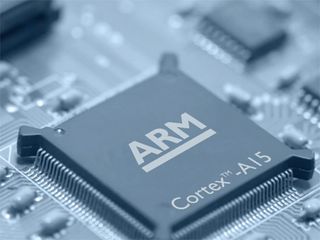ARM Enjoys Provoking Intel: We Lead the SoC Race
Is this like teasing a sleeping giant?

Over the long haul, it is innovation and better products that appeal to customers. For some strange reason, ARM has been engaging in making remarks that are either grossly underestimating Intel, or saying that Intel's strategy on how to gain traction in the smartphone and tablet world is doomed.
In a conversation with EETimes, ARM CEO Warren East said that Intel does not have the manufacturing advantage in SoCs at this time. "For SoC Intel is manufacturing using 32-nm high-k metal gate planar CMOS," East said. "TSMC is manufacturing using 28-nm high-k metal gate. That doesn't sound like a massive lead to me. If anything, you could argue that TSMC is ahead." He added that Intel would have a tough time to create 22-nm FinFET technology for SoC.
What makes these statements so interesting are the impressions we see and the information we have from the real world. Intel's 22 nm FinFET for SOCs is scheduled to arrive in 2013, with the next shrink anticipated for 2014. Intel has a talent of bending the time frames of new manufacturing timelines in its marketing and PR, but nevertheless, the company has delivered on its tight manufacturing schedules and capabilities for well over a decade. We also know that Intel tends to be developing its best technology when it is under severe competitive pressure. On the other hand, there is no FinFET for ARM either and recent notes suggest that prototype systems may be arriving in late 2013 or early 2014. In a response to EETimes, East said "it's hard to say exactly when it [FinFET for ARM] is going to arrive."
Of course, East has an enviable ecosystem of partners, all of which currently enjoy that they are ahead of Intel and have market superiority. However, scenarios like these can change.
Has East reason to be so optimistic and tease Intel? Share your thoughts in the comments below.
Contact Us for News Tips, Corrections and Feedback
Stay on the Cutting Edge
Join the experts who read Tom's Hardware for the inside track on enthusiast PC tech news — and have for over 25 years. We'll send breaking news and in-depth reviews of CPUs, GPUs, AI, maker hardware and more straight to your inbox.
-
wintermint Hey this works for me.. provocation leads to retaliation (with better products hopefully) and more SoC = better tech, better price-performance ratio, and CONSUMERS WIN :DReply -
phatboe ReplyHey this works for me.. provocation leads to retaliation (with better products hopefully) and more SoC = better tech, better price-performance ratio, and CONSUMERS WIN :D
agreed, I say let the fight begin. I'll sit back and watch while eating popcorn. -
boiler1990 Considering TSMC is having issues fabbing 28nm, and Intel has 22nm FinFETs (just not in their SoCs), these are some pretty bold claims.Reply
I think ARM will eventually be hit where they aren't expecting it, since Intel tends to not leak information. I would expect them to develop a 22nm SoC that can oust the next generation ARM SoC, but more importantly it will cost less because Intel doesn't have to contract out its fabrication like ARM has to do with TSMC. In the end, Intel will most likely win the price battle, and as we know that is what buys you a seat at the poker table. -
Chainzsaw Wait a second, isn't Intel one of ARM's biggeset customers?Reply
http://www.tomshardware.com/news/intel-arm-cpu-processor-chips,15923.html
It's almost like the relationship between Apple and Microsoft. -
Cazalan It's clear Intel underestimated the explosion of the smart phone/tablet market.Reply
They have corrected course though and the big guns are lining up for 14nm domination. -
cbfelterbush The 14nm will be the turning point, Intel is pouring billions into its own 14nm fab. When they are both ready to market Intel will be able to deliver of their own volition. Arm will still have to rely on TSMC.Reply
-CB -
superp ARM really meant it. They wants to see what Intel could have been hiding...or withholding. Well they are going to get it, and some. Lets hope everyone is prepared what's coming.Reply -
jcaulley_74 I seem to remember AMD riding this same high and mighty horse back in the old Athlon days right up through the x64/IA64 debate...probably going to come to the same end with this one. Intel should never be taken lightly.Reply -
jwcalla I don't think Intel's primary challenge is technical... it's just that ARM has become established in the industry. Android and WinRT probably aren't much of an issue, but moving the iOS ecosystem over to x86 would seem to be rather disruptive... and for what gain?Reply
And it's not Intel vs. ARM... Apple, Samsung, Qualcomm, TI, etc. are all making their own SoCs. Some are straight-up ARM designs, but not all.
Most Popular






